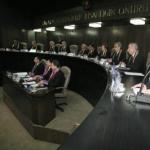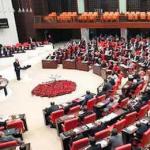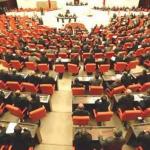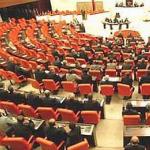The government's Constitutional Reform Package has passed through the Constitutional Commission in Parliament. This is the second part of a summary of the amendments as they have been passed by the Commission.
Click here for the first part of the summary.
Constitutional Court
Article 146: Organization of the Constitutional Court.
The Constitutional Court shall be composed of 17 full members instead of eleven regular and four substitute members. The Turkish Grand National Assembly shall elect two members out of three candidates proposed by the Court of Auditors General Assembly; one member is to be elected out of three candidates from lawyers of the Bar Association. Elections will be held secretly.
The President of the Republic shall appoint two regular and two substitute members from the High Court of Appeals, two regular and one substitute member from the Council of State, and one member each from the Military High Court of Appeals, the High Military Administrative Court and the Audit Court, three candidates being nominated for each vacant office by the Plenary Assemblies of each court from among their respective presidents and members, by an absolute majority of the total number of members; the President of the Republic shall also appoint one member from a list of three candidates nominated by the Higher Education Council from among members of the teaching staff of institutions of higher education who are not members of the Council, and three members and one substitute member from among senior administrative officers and lawyers.
The president and two deputies shall be elected in a secret absolute majority vote from amongst the members of the Constitutional Court for a term of four years. Elected candidates can be re-elected after their term has expired.
Article 147: Termination of Membership. The draft law suggests limiting the duration of term for members of the Constitutional Court. Members shall be elected for the duration of 12 years. A person cannot be elected for a second term. Members will retire before their end of term if they have reached retirement age.
Article 148: The amendment of the article on "Functions and Powers of the Constitutional Court" proposes to recognize the right of personal application.
The President of the Republic, the Chief of General Staff, members of the armed forces and the Gendarmerie General Command shall be tried for offences related to their functions by the Supreme Court. Appeals can be filed against the Supreme Court decisions for a new investigation. The decision of the General Assembly on the result of the investigation is final.
Everybody shall be entitled to apply to the Constitutional Court under allegations of a violation of basic rights and freedoms under the protection of the Constitution by public forces or a violation of constitutional rights and freedoms in the context of the European Convention on Human Rights, if all other legal remedies are exhausted.
Article 149: Functioning and Trial Procedure. According to amendments related to article 149, the draft law foresees that the Constitutional Court shall consist of two parts working as a General Assembly. The section of the Constitutional Court will meet with four members under the presidency of the deputy president. The General Assembly shall consist of at least 12 members under the presidency of the court judge or a deputy president appointed by the president. Decisions taken by the sections and the general assembly can only be taken by absolute majority vote. Commissions can be established for the assessment of acceptance of individual applications.
The General Assembly shall deal with cases and prosecutions conducted by the Supreme Court related to political parties, annulment suits and appeals. Correspondent sections shall decide on individual applications.
Cancellation of Constitutional amendments, the closure of political parties or deprivation of subsidies shall be decided by the Constitutional Court by a majority vote of two thirds.
The Constitutional Court shall examine cases on the basis of documents in the case file, except where it acts as the Supreme Court. The court can decide to hold a hearing on an individual application.
Article 156: Military High Court of Appeals. The Military Court of Appeals shall not be concerned with the members' requirements of military service regarding disciplinary and personnel matters relating to the status of its members. This shall be taken into consideration by the judgeship.
Article 157: High Military Administrative Court of Appeals. Members of the Supreme Military Administrative Court shall benefit from judicial assurance.
Supreme Board of Prosecutors and Judges (HSYK)
Article 159: The article on the "Supreme Board of Prosecutors and Judges" (HSYK) is subject to the following amendments: The number of members shall be increased from seven to 22 and there shall be 12 deputy members. The HSYK shall consist of three chambers.
The President shall appoint four regular members from the members of staff of law, economy and political branches of high education institutions, high level executives and lawyers. The Supreme Court General Assembly shall appoint three regular and three substitute members from among the members of the Supreme Court. The State Council General Assembly appoints two regular and two substitute members from the members of the State Council. One regular and one substitute member is appointed by the General Assembly of the Turkish Justice Academy from academy members. Elected candidates may be re-elected after their term has expired.
Appeals can be filed against the Board's decision of a "vocational ban". Otherwise, there shall be no appeal to any judicial instance against the decisions of the Council.
Prosecution of putchists becomes possible
Article 166: The Economic and Social Council shall be taken within the scope of the Constitution.
Article 15: Suspension of the Exercise of Fundamental Rights and Freedoms. The provisional article 15 shall be lifted according to the draft law. It prevented the prosecution of the coup leaders of 12 September 1980 and those who governed the country afterwards.
Provisional Articles
Three additional articles shall be added to the Constitution.
Article 69: Principles Observed by Political Parties. The financial auditing of political parties shall be done by the Constitutional Court for the year 2009. This shall be transferred to the Court of Auditors from 2010 onwards.
According to clause 19 of the draft law, deputy members of the Constitutional Court shall obtain the status of "regular members" with the date of the bill's enforcement.
Members of the HSYK from the Supreme Court and the Council of Ministers shall finish their regular term after the enforcement of the draft law.
Clause 27 of the draft law proposes that the bill shall be enforced as it was passed into law. In case of a public referendum the bill will be subject to approval as a whole. (TK/VK)


















